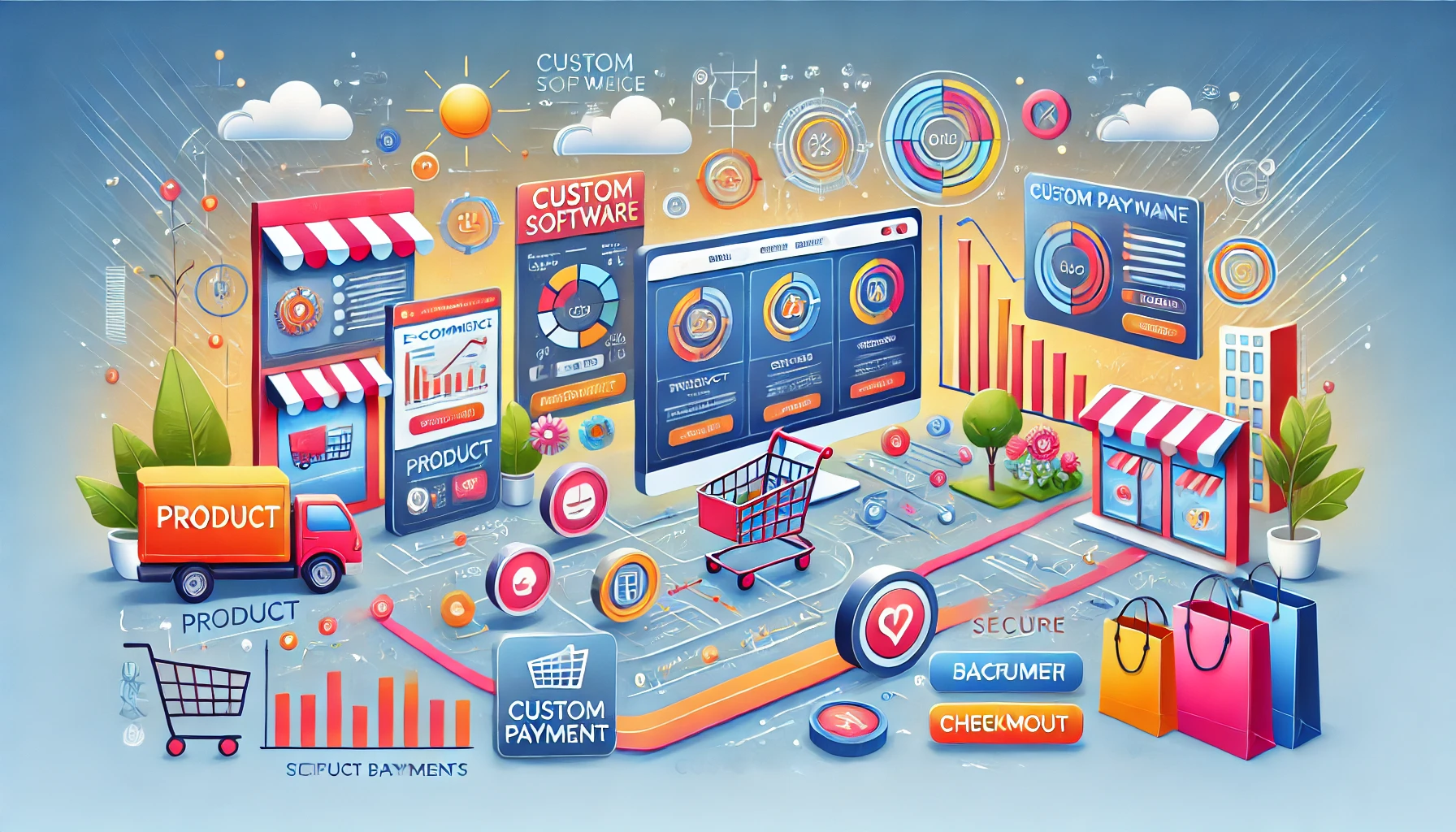
Why Custom Software Solutions for E-commerce are Critical for Growth
In the highly competitive world of e-commerce, businesses need more than just off-the-shelf platforms to thrive. With rapidly evolving customer expectations, rising competition, and complex operational needs, relying on generic software is no longer enough. To stand out and scale effectively, companies must leverage custom software solutions tailored to their unique business models.
Custom solutions enable e-commerce brands to deliver personalized experiences, streamline backend processes, and integrate seamlessly with third-party services—allowing them to meet market demands faster. Whether it’s automating inventory management, offering seamless checkout flows, or ensuring compliance with security standards like PCI-DSS, custom software is essential for sustainable growth.
As consumer behavior shifts and new trends emerge, custom solutions provide the scalability and flexibility needed to keep up. A business equipped with custom-built tools isn’t just managing day-to-day operations more efficiently—it’s future-proofing itself to adapt to new technologies and trends.
In this post, we’ll explore how tailored software solutions are revolutionizing the e-commerce space, enhancing both customer satisfaction and business operations. From backend automation to personalized front-end experiences, we’ll dive into the many ways that custom software helps companies grow, innovate, and succeed in an increasingly complex digital marketplace.
1. The Role of Technology in E-commerce Growth
E-commerce has grown beyond simple online stores—it’s now an ecosystem where technology drives every aspect of the customer journey and business operation. As consumer expectations shift and new competitors emerge, custom software solutions are becoming essential for businesses aiming to thrive in this fast-changing landscape. To stand out, companies must go beyond generic platforms and adopt tailored software tools that align with their specific needs.
The Shift from Generic Platforms to Tailored Solutions
Generic e-commerce platforms like Shopify or WooCommerce are great starting points. However, as businesses grow, unique challenges arise that these platforms may struggle to meet without costly workarounds. Custom software allows businesses to design their stores and workflows around their specific processes, ensuring that the technology aligns perfectly with their goals.
- Tailored checkout flows create frictionless customer journeys, improving conversion rates.
- Custom dashboards provide in-depth analytics, helping businesses make faster, data-driven decisions.
- Specialized features—like personalized product recommendations—ensure a competitive advantage that off-the-shelf solutions often lack.
Meeting Evolving Consumer Expectations
Consumers today expect personalized, seamless experiences from every brand they interact with. Businesses that rely solely on generic platforms often struggle to keep up with these expectations, as they are limited by the platform’s standard features.
With custom solutions, companies can offer:
- Real-time product recommendations based on user behavior.
- Personalized email flows triggered by customer activity.
- Advanced loyalty programs that reward repeat buyers with tailored offers.
These enhancements build customer loyalty and improve overall satisfaction, giving e-commerce businesses an edge in an increasingly crowded market.
Staying Competitive in a Crowded Marketplace
The e-commerce space is more competitive than ever, with businesses constantly battling for customer attention. Relying on outdated software or basic tools can slow down operations, limit growth, and reduce profitability. Custom software ensures that companies can scale efficiently and outperform competitors by offering distinct, high-value experiences.
For instance:
- Automating processes like inventory management and order tracking reduces errors and frees up time for business growth.
- Custom integrations with third-party apps—like payment processors or marketing platforms—create smoother workflows.
- Personalized software solutions ensure better performance during peak seasons, such as Black Friday or holiday sales, with fewer disruptions.
Custom software solutions are no longer just a luxury—they are critical for companies that want to meet modern customer demands and scale effectively in a competitive market. From tailored user experiences to automated backend operations, these tools empower businesses to streamline workflows, enhance engagement, and grow sustainably.
2. Enhancing User Experience with Custom Software
In the world of e-commerce, user experience (UX) is everything. A smooth, intuitive shopping experience ensures that customers stay engaged, complete their purchases, and come back for more. While off-the-shelf solutions offer standard interfaces, they often fail to meet the unique demands of businesses aiming to deliver a personalized, seamless UX. This is where custom software solutions step in, providing the tools needed to elevate every interaction—from browsing to checkout.
Personalization and Dynamic Content Delivery
Customers crave personalization. They want products, recommendations, and offers tailored to their preferences. Custom-built e-commerce platforms allow businesses to deliver content dynamically, creating individualized experiences that drive engagement.
- AI-powered recommendation engines suggest products based on browsing history and user behavior.
- Personalized landing pages greet customers by name and showcase products relevant to them.
- Custom software allows businesses to automate discounts and offers based on customer segments, encouraging repeat purchases.
Faster Page Loads with Optimized Code
Slow-loading pages frustrate users and hurt your search rankings. Custom software ensures that your e-commerce store is built for speed, improving both user experience and SEO performance.
- Optimized back-end code ensures fast loading times, even with large product catalogs.
- Custom content delivery networks (CDNs) minimize latency for users around the globe.
- Real-time performance monitoring tools help identify bottlenecks before they impact the user experience.
Seamless Checkout and Payment Gateways
A complicated checkout process is one of the top reasons for cart abandonment. Custom software solutions allow businesses to create smooth, streamlined checkout experiences that reduce friction and encourage conversions.
- One-click checkout options make the purchase process fast and convenient.
- Integration with multiple payment gateways, including credit cards, PayPal, and digital wallets, ensures flexibility for customers.
- Custom checkout flows with localized currency and tax calculations enhance the experience for international shoppers.
A well-designed checkout can make the difference between a completed sale and an abandoned cart. Is your checkout process optimized? Talk to us and find out how we can help.
3. Streamlining Operations with Custom Backend Solutions
Behind every successful e-commerce store lies a robust backend infrastructure that keeps everything running smoothly—from inventory tracking to customer management. Relying on generic platforms can often lead to inefficiencies, as these systems may not align perfectly with the unique operational needs of growing businesses. Custom backend solutions offer the flexibility to optimize workflows, reduce manual work, and integrate seamlessly with existing systems.
Automated Inventory and Order Management
Inventory management is critical in e-commerce. Running out of stock or overselling can harm customer satisfaction and revenue. With custom backend software, businesses can automate key processes, reducing human error and increasing operational efficiency.
- Real-time inventory tracking ensures accurate stock levels across multiple warehouses or sales channels.
- Automated order fulfillment connects inventory systems directly to logistics providers for faster delivery.
- Alerts for low-stock thresholds enable timely reordering, preventing stockouts and lost sales.
Custom ERP Integrations for Supply Chain Efficiency
A well-integrated enterprise resource planning (ERP) system enables businesses to manage their entire supply chain from a single platform. Custom integrations allow e-commerce stores to connect their sales, inventory, accounting, and logistics systems for maximum efficiency.
- Track product movement from supplier to customer, ensuring smooth operations.
- Automate invoicing, payments, and financial reporting to reduce manual work.
- Synchronize data across departments, so everyone has access to the latest information.
By building custom ERP solutions, businesses can improve visibility across their supply chain and make better, data-driven decisions.
Real-Time Data Analytics for Informed Decision-Making
Data is at the heart of every modern business decision. Custom software solutions provide tailored analytics dashboards that allow e-commerce managers to monitor their business performance in real-time and respond quickly to market changes.
- Track sales trends, customer behavior, and product performance with visual dashboards.• Track sales trends, customer behavior, and product performance with visual dashboards.
- Set up custom KPIs to monitor conversion rates, cart abandonment, and customer satisfaction.
- Use predictive analytics to forecast demand patterns and optimize inventory planning.
4. Security and Scalability with Custom E-commerce Software
In today’s digital marketplace, security and scalability are non-negotiable. As e-commerce businesses grow and handle more transactions, protecting sensitive customer data while ensuring smooth performance under high traffic becomes paramount. Custom software solutions allow businesses to meet these demands with advanced security protocols and a scalable infrastructure that supports long-term growth.
Advanced Security Features for Fraud Prevention
With the rise of online transactions, e-commerce platforms face increasing risks of fraud, data breaches, and cyberattacks. Custom-built security features can protect both businesses and customers by providing multi-layered protection.
- End-to-end encryption ensures that payment data and personal information are transmitted securely.
- Two-factor authentication (2FA) and CAPTCHA reduce the risk of unauthorized access and bot activity.
- Real-time fraud detection tools monitor for suspicious behavior, such as unusual login attempts or fraudulent transactions.
Ensuring Compliance with Regional Regulations
E-commerce businesses must comply with various regional regulations, such as PCI-DSS for payment security and GDPR for data privacy. Custom software solutions ensure that your platform remains compliant with these standards, avoiding penalties and fostering trust with your customers.
- Data anonymization tools protect user privacy while ensuring compliance with GDPR.
- Secure payment gateways that meet PCI-DSS standards protect your business from legal and financial risks.
- Audit trails and automated reporting features make compliance monitoring effortless.
Scalable Architecture to Handle Traffic Spikes
E-commerce businesses often experience fluctuations in traffic—whether it’s during sales events like Black Friday or peak shopping seasons. A platform built with scalability in mind ensures that your website can handle these spikes without compromising performance.
- Load balancing systems distribute traffic evenly across servers, preventing downtime.
- Cloud-based solutions allow businesses to scale resources dynamically based on real-time demand.
- Scalable platforms minimize page load times, keeping bounce rates low and customer satisfaction high.
5. Integration with Third-Party Services and APIs: Unlocking New Capabilities
Seamless third-party integrations have become essential for e-commerce businesses to stay competitive. Whether it’s synchronizing with CRM systems, automating marketing workflows, or connecting to marketplaces like Amazon and eBay, integrating external tools enhances your platform’s efficiency and extends its functionality. Custom software solutions ensure that these integrations are tailored to your business model, eliminating friction and maximizing performance.
Connecting with Marketing Automation Tools
A powerful marketing strategy requires automation tools to handle repetitive tasks and deliver personalized campaigns at scale. Custom integrations ensure these tools work harmoniously with your e-commerce store, giving you greater control over your marketing efforts.
- Email marketing tools send automated campaigns triggered by user actions, such as cart abandonment.
- Social media integrations enable cross-platform promotion, syncing your store with channels like Instagram or Facebook
- Analytics dashboards aggregate data from multiple sources, offering actionable insights to optimize marketing efforts.
Multi-Channel Integration with Marketplaces
Many businesses expand by selling across multiple marketplaces. Custom software solutions ensure that your inventory, orders, and pricing are synchronized across platforms, preventing errors and overselling.
- Integrate with Amazon, eBay, or Etsy to expand your reach and attract new customers.
- Centralized order management ensures that all purchases—regardless of platform—are processed efficiently.
- Automated pricing tools adjust prices dynamically based on demand or competition, ensuring you stay competitive.
Synchronizing with CRM and Customer Support Platforms
Customer relationships are critical to the success of any e-commerce business. Integrating your store with CRM platforms ensures that customer data is centralized and easily accessible, improving both marketing and support efforts.
- CRM systems track customer behavior across multiple touchpoints, helping you create personalized offers.
- Integrated live chat and helpdesk tools provide real-time support, boosting customer satisfaction
- Custom APIs sync order history and account details, offering seamless service across all channels.
Why Custom Integrations are Key to Business Growth
6. Custom Software as a Competitive Advantage
In today’s rapidly evolving market, businesses need more than just standard tools to stay ahead. Custom software solutions empower companies to align their technology precisely with their unique needs and goals, offering distinct features that foster growth and give them a clear competitive edge. From tailoring solutions to niche business models to future-proofing for upcoming trends, custom software equips businesses to scale confidently and thrive in a competitive landscape.
Tailoring Solutions to Unique Business Models
Every business operates differently, and one-size-fits-all solutions often limit operational efficiency and growth potential. Custom software development enables companies to design tools and workflows that align perfectly with their specific needs—whether it’s automating unique processes or integrating with proprietary systems.
- Niche industries benefit from software tailored to their unique operations, such as logistics platforms for e-commerce or specialized CRM tools for real estate.
- Custom solutions ensure flexibility in workflows, enabling companies to respond quickly to operational challenges.
- Tailoring software avoids unnecessary features found in generic platforms, reducing complexity and improving usability.
Offering Distinct Features that Stand Out
Custom software allows businesses to differentiate themselves from competitors by offering features that standard platforms cannot provide. These unique features enhance both the customer experience and backend operations, setting the business apart in the market.
- Personalized dashboards provide deep insights tailored to business goals and performance metrics.
- Customer-facing apps with bespoke features like tailored loyalty programs or one-click reordering boost engagement and retention.
- Unique product configurators or AI-powered tools offer personalized shopping experiences, enhancing customer satisfaction.
These distinct features help businesses build brand loyalty and credibility, creating a stronger market presence.
Future-Proofing for Market Changes and Trends
The digital landscape is constantly changing, with new technologies and consumer trends emerging regularly. Businesses that rely on rigid, pre-packaged software risk falling behind. Custom solutions ensure scalability and adaptability, allowing companies to integrate new features or pivot quickly as the market evolves.
- Modular architectures allow businesses to add or update features without disrupting operations.
- Staying ahead of trends like AI, blockchain, or IoT ensures long-term relevance in a competitive environment.
- Future-proof software reduces the need for costly migrations, as it evolves with market demands and technological advancements.
Frequently Asked Questions (FAQs)
1. Why should I invest in custom software for my e-commerce store?
Custom software offers tailored solutions that align perfectly with your business needs, enabling enhanced user experience, backend automation, and scalability. Unlike generic platforms, custom solutions adapt to your operations, allowing you to meet specific business goals efficiently.
2.What CMS platforms do you specialize in?
Custom solutions provide personalized recommendations, seamless checkout processes, and dynamic content delivery. These features boost user engagement and satisfaction, helping to reduce cart abandonment and drive repeat purchases.
3. Can custom software integrate with third-party platforms like CRM or marketplaces?
Yes, custom software can seamlessly integrate with CRM systems, payment gateways, and marketplaces such as Amazon and eBay. This ensures synchronized operations across multiple channels, streamlining order management and improving overall efficiency.
4. Is custom software scalable for business growth?
Absolutely. Custom software is built with scalable architecture that allows it to grow with your business. Whether you experience seasonal surges or long-term growth, the platform adapts to handle increased demand without compromising performance.
5. How does custom software enhance security?
Custom software comes with advanced security protocols, such as encryption, two-factor authentication, and fraud detection tools. These features help businesses safeguard customer data and comply with regulations like PCI-DSS and GDPR.
6. How long does it take to develop custom software for an e-commerce store?
The timeline varies based on the complexity and features required. On average, development can take several weeks to a few months, depending on customization needs. We ensure transparent communication throughout the process, keeping you informed at every stage.
7. What ongoing support do you provide after launch?
We offer post-launch support to maintain, update, and scale your custom software. This includes regular performance monitoring, security updates, and adding new features as your business evolves
Conclusion: Elevate Your E-commerce Business with Custom Software Solutions
Custom software solutions are no longer a luxury for e-commerce businesses—they are the key to unlocking growth, efficiency, and long-term success. As the market becomes increasingly competitive and customer expectations evolve, businesses must invest in tailored solutions that align perfectly with their unique needs. With features like personalized user experiences, seamless third-party integrations, enhanced security, and scalable architecture, custom software empowers e-commerce brands to stay ahead of the curve.
The right software not only streamlines backend operations but also transforms customer journeys, leading to higher conversions and stronger brand loyalty. Imagine having a platform that automates repetitive tasks, provides real-time insights, and adapts as your business grows—this is the advantage of custom software.
As you prepare to take your business to the next level, it’s important to ask yourself: Is your current platform truly meeting your needs? If you find yourself limited by generic tools or struggling to scale effectively, it’s time to explore a tailored solution designed with your growth in mind.
Still unsure?
Ready to transform your business with custom software?
Contact us today to schedule a free consultation, and let’s build a platform that drives your success. Your e-commerce future starts now—are you prepared to make the leap?


